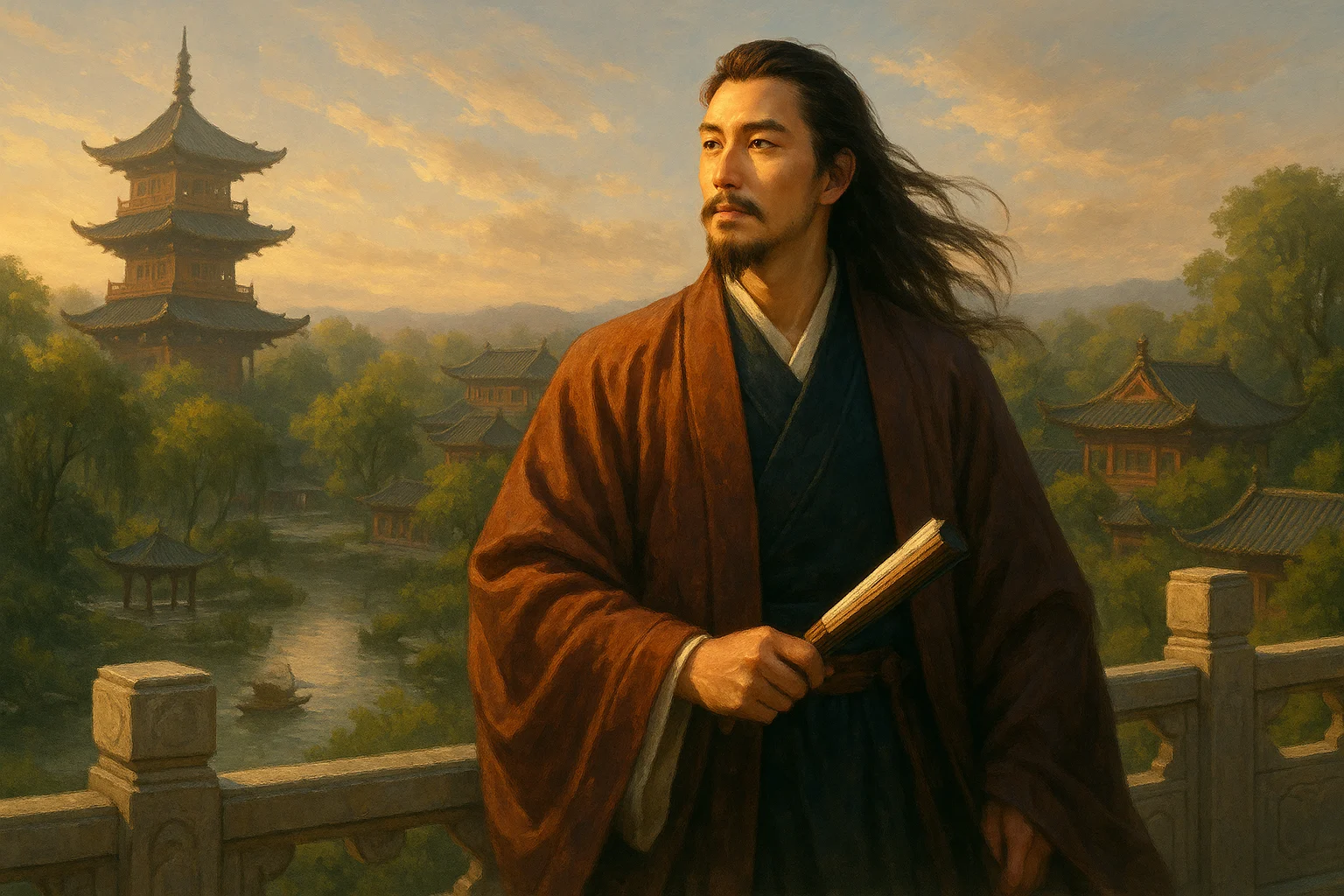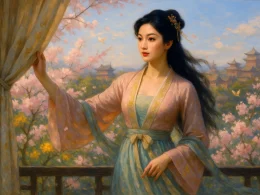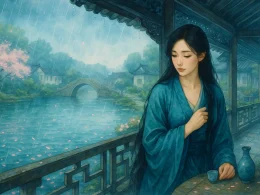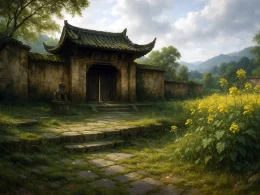This land—an imperial biome,
Where auspicious smog thickens the gloam.
Four centuries fossilize into one sleep—
Bitter truth:
Jin dynasty bones now mound deep.
Along the river I drift like stray code,
Climbing towers beyond the last node.
Don't ask of time's lost datasets—
Just turn:
The Yangtze's blind entropic flow forgets.
Original Poem
「南乡子 · 自古帝王州」
自古帝王州,郁郁葱葱佳气浮。
四百年来成一梦,堪愁,晋代衣冠成古丘。绕水恣行游。上尽层楼更上楼。
王安石
往事悠悠君莫问,回头。槛外长江空自流。
Interpretation
This ci poem was composed during Wang Anshi's later years when he was living in exile in Jinling (present-day Nanjing). Having resigned from his position as chancellor, he retired to Jiangning where he nominally served as prefect but remained emotionally detached from official duties. Facing the magnificent Jinling—once the capital of six dynasties—Wang ascended heights to gaze into the distance and reminisce about the past, expressing profound lamentations over the contrast between past prosperity and present decline. The poem subtly conveys his complex emotions of unfulfilled ambitions and continued concern for the nation. Written amid this intertwining of history and personal experience, the verses contain both the philosophical reflections of "ascending to gaze afar" and deeply concealed political will.
First Stanza: "自古帝王州,郁郁葱葱佳气浮。四百年来成一梦,堪愁,晋代衣冠成古丘。"
Zì gǔ dì wáng zhōu, yù yù cōng cōng jiā qì fú. Sì bǎi nián lái chéng yī mèng, kān chóu, Jìn dài yī guān chéng gǔ qiū.
Since ancient times an imperial capital,
lush and luxuriant, permeated with auspicious aura.
Four hundred years have dissolved into a single dream—
how lamentable!
The robed scholars of the Jin Dynasty now lie in ancient graves.
The poet begins by highlighting Jinling's ancient identity as an "imperial capital," followed by a description of its vibrant spiritual energy—"auspicious aura" subtly implying regal majesty. "Four hundred years have dissolved into a single dream" encapsulates the passage of time and the disillusionment of human affairs in a single line, leaving only sorrow and sighs upon awakening. "The robed scholars of the Jin Dynasty now lie in ancient graves" draws on the sentiment of historical rise and fall, depicting how the landscape remains while people have changed, while also aligning with the poet's cold scrutiny of the current political situation. The first stanza juxtaposes desolation against grandeur and solemnity against worldly dreams, conveying profound and complex emotions.
Second Stanza: "绕水恣行游。上尽层楼更上楼。往事悠悠君莫问,回头。槛外长江空自流。"
Rào shuǐ zì xíng yóu. Shàng jìn céng lóu gèng shàng lóu. Wǎng shì yōu yōu jūn mò wèn, huí tóu. Kǎn wài Cháng jiāng kōng zì liú.
I wander freely along the river's edge,
ascending tower after tower, climbing ever higher.
The past is vast—do not inquire, my friend.
Turn your head:
beyond the railing, the Yangtze flows emptily eastward.
"Wander freely along the river's edge" is richly symbolic: the act of freedom actually reflects the restless flow of inescapable melancholy. The poet strolls by the river, appearing at ease but in truth depicting inner helplessness and wandering. "Ascending tower after tower" vividly captures this action—climbing towers traditionally symbolizes "longing for the distant" and "seeking hope," but here it more prominently reflects the poet's intertwining recollections of history and aspirations for the future.
"The past is vast—do not inquire" is straightforward yet deeply meaningful. This line both rejects answering worldly disturbances and can be seen as concealing his own thoughts. The concluding line, "beyond the railing, the Yangtze flows emptily eastward," follows from "turn your head" while also responding to "dissolved into a single dream." The Yangtze symbolizes history, calmly observing the changes of the human world—the flow of time and the poet's inner emptiness achieve perfect unity here, forming an immortal line.
Holistic Appreciation
The entire poem begins with the geographical symbolism of Jinling as an ancient capital, using the scenery to express emotions and incorporating the author's complex reflections on history, ideals, and reality. The first stanza focuses on "gazing"—observing the rise and fall of history and the flourishing and withering of culture; the second stanza emphasizes "wandering" and "ascending," depicting the fluctuating thoughts embedded in actions, ultimately returning to the philosophical realm of "emptily flowing." The poet entrusts his state of mind to the landscape, transforming "concern for the nation" into "the empty river's waters," expressing the loftiness and resilience within life's vicissitudes.
Though seemingly simple, the poem carries meaning beyond words, with each line pregnant with thought. The contrast between "imperial capital" and "ancient graves" is striking, while "wandering along the river" and "climbing ever higher" intertwine seamlessly. The conclusion, using the river to symbolize the long flow of history, elevates the poem's meaning to a realm of profound serenity.
Artistic Merits
- Beginning with place, borrowing history to express emotions:
The poem uses Jinling as its backdrop, depicting both its geographical grandeur and borrowing the decline of ancient scholars to express the disillusionment of modern ideals. - Allusions naturally and seamlessly integrated into the lines:
Phrases like "auspicious aura," "dissolved into a single dream," "robed scholars now lie in ancient graves," and "the Yangtze flows emptily" all incorporate allusions without leaving traces, creating far-reaching imagery. - Depicting stillness within movement, containing thought within stillness:
The poet's wandering, tower-climbing, and looking back are all dynamic strokes that ultimately return to inner contemplation and emptiness. Though emotional fluctuations run deep, their expression remains restrained and sparse. - Philosophical thought permeates the entire poem, blending emotion and reason:
Whether reminiscing about history, lamenting life, or confronting present helplessness, all are expressed through seemingly light language, giving the poem a meditative beauty of "distant observation."
Insights
The remembrance of history, the scrutiny of reality, and the contemplation of the future are not isolated processes but an integrated spiritual journey. On the surface, Wang Anshi climbs towers and wanders rivers to reminisce about the past, but in truth, it is a profound reflection on life. He refuses to indulge in sorrow and melancholy, instead seeking inner order and faith within the philosophical thought of "emptily flowing." This perspective, connecting personal fate with the torrents of history, is a reflection of the scholar-official spirit. It also allows us as readers to sense the eternal resonance between history and ourselves while savoring ancient poetry.
About the Poet

Wang Anshi (王安石 1021 - 1086), a native of Linchuan in Jiangxi, was an outstanding statesman, writer, and thinker of the Northern Song Dynasty, counted among the "Eight Great Prose Masters of the Tang and Song Dynasties." His poetic achievements were particularly profound—his early works, filled with heroic language, revealed the ambition of a reformer. Though his ci poetry was few in number, it pioneered new realms of historical reflection. His poetry and prose combined intellectual depth with artistic value, and the over 1,500 works preserved in The Collected Works of Linchuan stand as a monumental testament to literary innovation in Song Dynasty literature.












